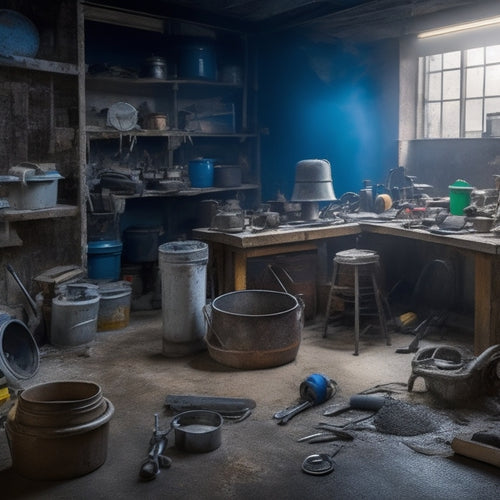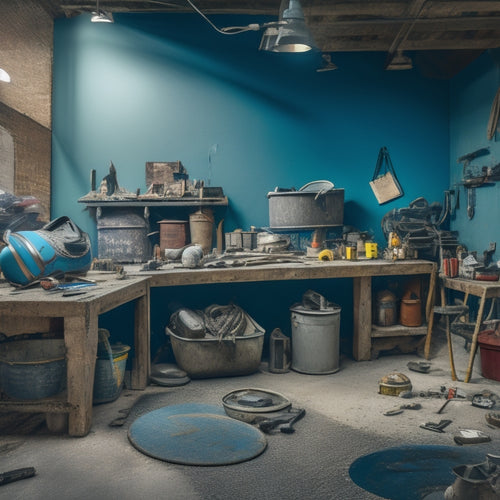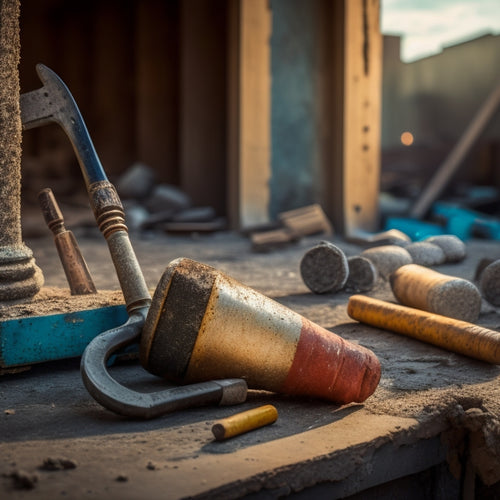
5 Best Power Tools for Concrete Adhesion Success
Share
You'll need the right arsenal of power tools to guarantee a strong bond between your anchors and concrete, and the following five essential tools will give you the edge you need to achieve concrete adhesion success. A rotary hammer drill delivers up to 50% more power and enhances drilling speed, while a high-torque impact wrench effortlessly loosens stubborn bolts and drives large anchors. A concrete scarifier prepares the surface, and the right drill bits guarantee precise holes for anchors. Finally, an angle grinder smooths rough spots, removing imperfections. With these tools, you'll be well-equipped to tackle even the most demanding concrete adhesion projects, and understanding their capabilities will take your work to the next level.
Key Takeaways
• Rotary hammer drills deliver up to 50% more power than traditional hammer drills for efficient concrete adhesion projects.
• High-torque impact wrenches effortlessly loosen stubborn bolts and drive large anchors for strong bonds with concrete.
• Concrete scarifiers are critical for surface preparation, removing old coatings and roughening surfaces for a strong bond between new material and substrate.
• Drill bits designed for anchoring, such as masonry and core drill bits, ensure reliable holes for anchors and withstand the hardness of concrete.
• Angle grinders smooth rough spots and remove imperfections, with adjustable speed settings and dust control systems for a cleaner work environment.
Rotary Hammer Drills for Efficiency
When tackling concrete adhesion projects, you'll find that rotary hammer drills greatly boost your efficiency by delivering up to 50% more power than traditional hammer drills. This increased power enables you to complete tasks faster and with less fatigue.
To maximize your rotary hammer drill's performance, it's vital to take into account drill selection and rotary speed.
When selecting a drill, look for one with a high rotary speed, typically measured in revolutions per minute (RPM). A higher RPM allows for faster drilling and increased productivity. Additionally, take into account the drill's bit capacity, as this will impact the size of anchors or screws you can use.
Optimizing rotary speed is also important. A variable speed control allows you to adjust the speed to suit the specific task and material you're working with. This flexibility guarantees you can tackle a range of concrete adhesion projects, from anchoring heavy machinery to installing decorative fixtures.
High-Torque Impact Wrenches
You'll find that high-torque impact wrenches are essential for tackling demanding concrete adhesion tasks, such as loosening stubborn bolts or driving large anchors.
These powerful tools deliver high torque performance, making them ideal for impact wrench applications that require heavy-duty force. With their ability to generate massive torque, you can confidently take on tasks that would be impossible with lesser tools.
Here are three key benefits of using high-torque impact wrenches for concrete adhesion:
-
Effortless bolt loosening: High-torque impact wrenches can loosen even the most stubborn bolts, saving you time and energy.
-
Fast anchor driving: With their immense power, you can drive large anchors quickly and efficiently, ensuring a strong bond between the anchor and concrete.
-
Reduced fatigue: By taking the strain out of manual labor, high-torque impact wrenches reduce operator fatigue, allowing you to work longer and more productively.
Concrete Scarifier for Surface Prep
Concrete Scarifier for Surface Prep
Surface preparation is a critical step in concrete adhesion, and a concrete scarifier is an essential tool for removing old coatings, roughening surfaces, and promoting a strong bond between new materials and the substrate. You'll want to choose the right scarifier type for your specific project needs. There are three main types: light, medium, and heavy-duty scarifiers.
| Scarifier Type | Recommended Use |
|---|---|
| Light-duty | Removing thin coatings, cleaning surfaces |
| Medium-duty | Removing thick coatings, roughening surfaces |
| Heavy-duty | Aggressive surface preparation, removing thick layers |
When selecting a scarifier, consider the surface area to be prepared, the type of coating or material to be removed, and the level of roughening required. By using the right scarifier, you'll guarantee a strong bond between the new material and the substrate, reducing the risk of adhesion failure. Remember, proper surface preparation is key to achieving successful concrete adhesion. Choose your scarifier wisely, and you'll be on your way to a durable, long-lasting finish.
Drill Bits for Anchoring Success
Selecting the right drill bits is essential for anchoring success, as they enable you to create precise, reliable holes for anchors in concrete. When it comes to drilling into concrete, you need bits that can withstand the intense hardness and abrasiveness of the material.
Here are three key considerations for choosing the right drill bits for anchoring success:
-
Masonry bits: These bits are specifically designed for drilling into concrete, brick, and block. They feature a tungsten carbide tip that's extremely hard and resistant to wear.
-
Core drilling: For larger anchors or deeper holes, you'll need to use a core drill bit. These bits remove a cylindrical core of material, allowing for precise, hole-saw-style drilling.
-
Bit material and coating: Look for bits made from high-quality materials, such as tungsten carbide or diamond-coated tips. These materials provide the necessary hardness and durability for drilling into concrete.
Angle Grinders for Smoothing Surfaces
When preparing concrete surfaces for anchoring, angle grinders prove indispensable for smoothing out rough spots and removing imperfections that could compromise adhesion.
You'll need a reliable angle grinder that can efficiently handle surface finishing tasks, such as removing bumps, cracks, and old adhesives. Look for a grinder with adjustable speed settings and a dust control system to minimize airborne particles and guarantee a cleaner working environment.
When selecting an angle grinder, consider the disc size, material, and grit. A larger disc size (e.g., 7-inch or 9-inch) provides more coverage, while a smaller size (e.g., 4-inch or 5-inch) offers greater precision.
Choose a disc material suitable for concrete, such as diamond-coated or carbide-tipped, and opt for a grit that matches your surface finishing requirements. For example, a coarse grit (e.g., 16 or 24) is ideal for aggressive material removal, while a finer grit (e.g., 60 or 80) is better suited for final surface preparation.
Frequently Asked Questions
Can I Use Power Tools for Concrete Adhesion in Confined or Enclosed Spaces?
When working in confined or enclosed spaces, you'll face unique challenges.
You must consider space constraints that limit your tool selection. In these situations, you'll want to choose tools that are compact, lightweight, and produce minimal dust and debris.
Consider using tools with adjustable handles or angled heads to improve maneuverability. Additionally, look for tools with dust collection systems or HEPA filters to minimize airborne particles.
How Do I Prevent Overheating When Using Power Tools on Concrete?
When working with power tools on concrete, you'll want to prioritize overheating prevention to guarantee peak performance and extend tool lifespan.
Regularly inspect and clean your tools to remove dust and debris, which can impede airflow and cause overheating.
Perform routine tool maintenance, such as lubricating moving parts and replacing worn-out components.
Additionally, take regular breaks to allow your tools to cool down, and consider using a cooling system or heat-resistant accessories to mitigate overheating risks.
Are Power Tools Suitable for Working With Epoxy-Based Adhesives?
You're about to set out on a sticky situation - literally!
When working with epoxy-based adhesives, you'll want to make sure your power tools are up for the task. Not all tools are created equal, and epoxy application demands specific compatibility.
You'll need tools that can handle the viscous nature of epoxy without clogging or damaging the material. Look for tools with specialized epoxy-friendly bits and accessories to make sure a smooth, successful bond.
What Safety Gear Is Essential for Operating Power Tools on Concrete?
When operating power tools on concrete, you must prioritize your safety above all else.
You'll need to wear essential protective equipment, such as safety glasses, gloves, and a dust mask, to prevent injuries from debris and airborne particles.
Familiarize yourself with industry safety standards, like OSHA guidelines, to guarantee you're meeting the necessary requirements.
Can I Rent Power Tools for Concrete Adhesion Instead of Buying Them?
When considering your concrete adhesion project, you're wise to explore cost-effective solutions.
Renting power tools can be a viable option, offering significant savings. You'll find rental options for drills, grinders, and saws at equipment rental centers or online platforms.
Before committing, calculate the rental duration and costs to verify it's a more economical choice than buying.
Weigh the pros and cons to determine if renting is the best fit for your project's specific needs.
Conclusion
Now that you've got the right arsenal of power tools, concrete adhesion success is within your grasp.
With these high-quality tools, you'll be able to blast through tasks with ease, precision, and speed.
Your concrete projects will rise from the ground like a phoenix, strong, durable, and flawless.
Get ready to release your inner master craftsman and leave a trail of impressive results in your wake!
Related Posts
-

7 Tools to Fix Damaged Concrete Floors
You're about to tackle that damaged concrete floor, and the right tools are essential for a successful repair. Start ...
-

What Tools Do You Need for Concrete Flooring
You'll need a thorough arsenal of specialized tools to achieve a high-quality, professional-looking concrete floor, i...
-

5 Tips for Splitting Concrete With Second-Hand Tools
When splitting concrete with second-hand tools, you'll need to be strategic to avoid wasting time, money, and putting...


